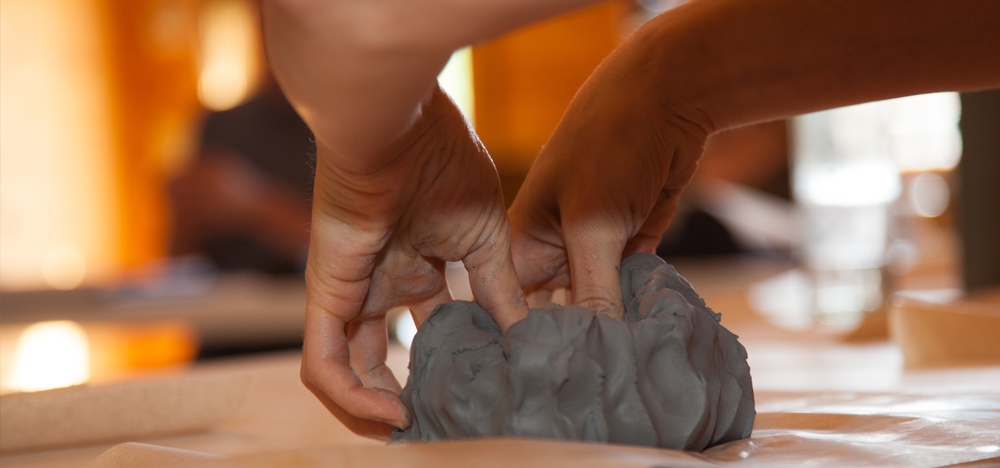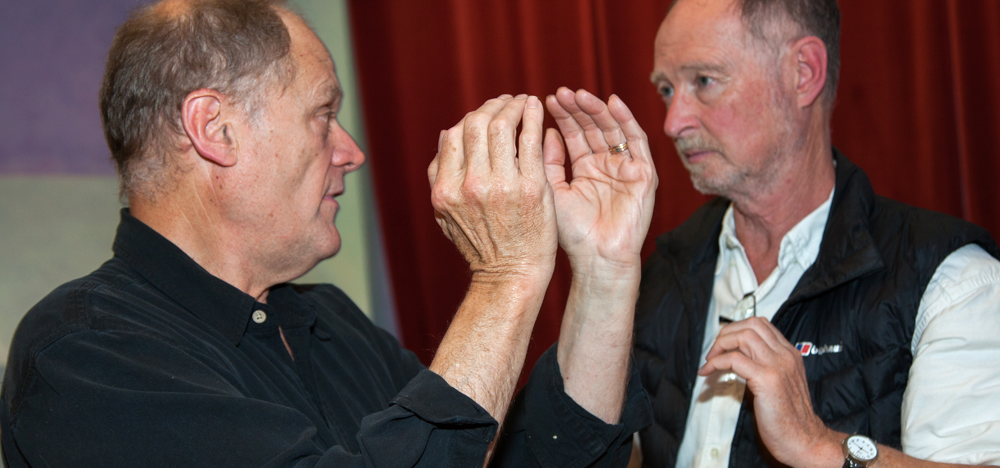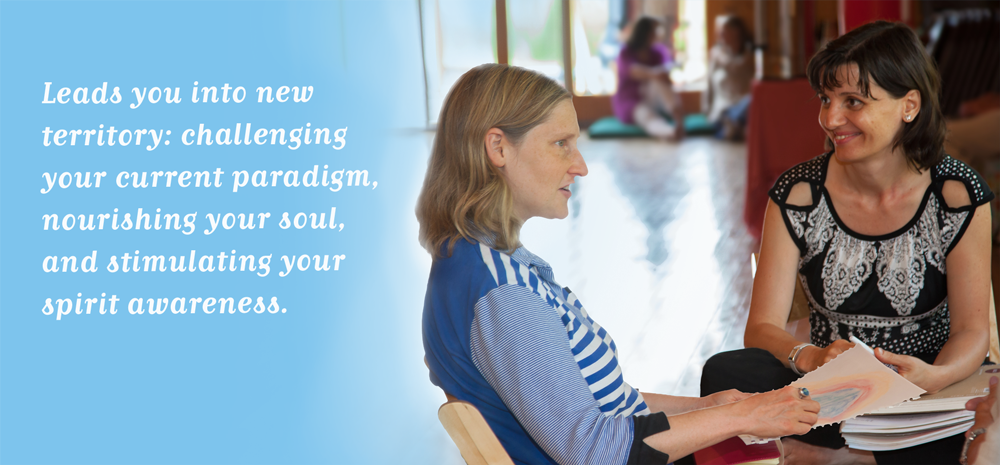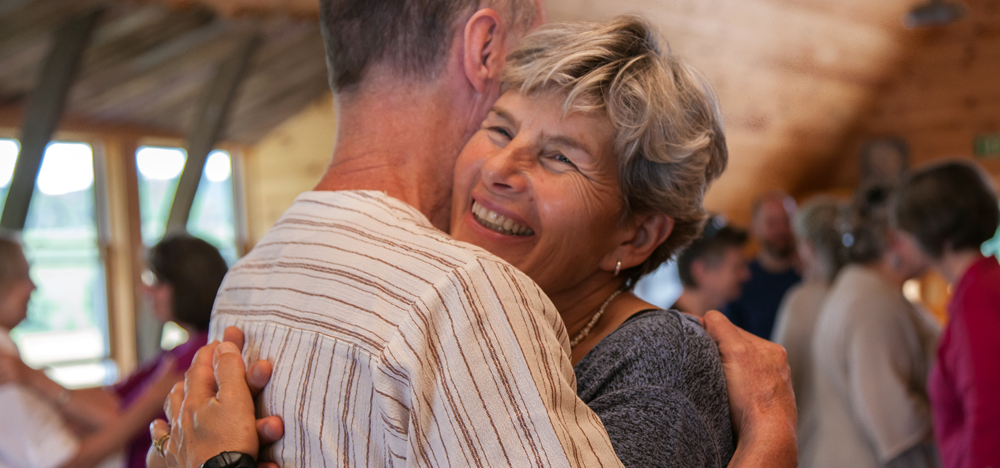 Core Seminars
Core Seminars

Each of the nine carefully designed seminars includes a balance of experiential exercises, lectures, artistic response, movement, individual contemplation, and the richness of human relationship. Within each seminar, sufficient time is created to ponder, digest, wrestle with, and integrate the rich content and experiences. Between seminars, live online conferences and “Between Queries” allow deeper understanding to ripen. Alterations to the curriculum can occur but this shows the general flow of concepts and experiences.
To enliven thinking and creativity, to foster learning, to stimulate the will to change, to assist self-knowledge and transformation, a range of learning methodologies are engaged throughout the 9 seminars: lecture, movement, study resources, creative artistic activities for the non-artist, imagery exercises, concentration and meditation, visual arts, expressing through clay and color, charcoal exercises, form drawing, storytelling, drama, role playing, nature observations, journaling.

Purpose, Principles & Practices of Anthroposophic Psychology
Revealing the value of anthroposophic psychology; placing anthroposophic psychology within the stream of contemporary psychology; psychosynthesis and anthroposophy alliance; uncovering who I am; recognizing education as self-education; human encounters as developmental wellsprings; principles of “becoming” contrasted with pathology orientation; progressing from Freud; evidence─ based; DSM and beyond; dimensions and dynamics of consciousness; awakening the will to learn and to change; differentiating presencing from mindfulness; ontological security as key to spiritual dimensions of the “I”; role of empathic resonance in healing; body, soul and spirit; introducing human nature as two-fold, three-fold, four-fold, seven-fold, nine-fold and twelve-fold; pathos and spiritus; contemporary soul challenges; humanity at the threshold between earthy and spiritual realities.

Discovering the Components and Contributions of the Sacred Wound and the Primal Wound
Humanity as carrier of the sacred wound; existential anxiety and its origin in the human story; primal wound linked to empathic failure; 4-fold birth of the human being: actual physical body, invisible life-body, desire body and “I”; exploring birth to age 7 (first septennial); trauma, cumulative trauma and dissociation as a response to trauma; personal self as child-of-history; spiritual aspects of our Child-of-Self; rethinking attachment and attachment disorders; brokenness as pathway to wholeness; exploring the multi-faceted 4-fold human nature; transference and counter-transference; sensory experience in the young child; encountering hidden complexes/subpersonalities; ego defenses as armor and obstacle; creating context for Oedipal dynamics; value of object relations theory; landscape of the soul; feelings and states of being; strengthening senses of life, balance, movement, touch; reality of hierarchical beings and their effect on human nature and human destiny.
 Childhood’s Trials and Accomplishments
Childhood’s Trials and Accomplishments
Rethinking Erik Erikson’s developmental stages from a spiritual psychology lens; exploring ages 7 to 14 (second septennial); life/etheric forces as basis of a living being; deepening principles linked to aspects of consciousness: lower unconsciousness, higher unconsciousness, middle unconsciousness; repression barriers as shadow and guardians of threshold between ordinary consciousness and spiritual consciousness; the 9-year change as gateway to earthly maturity; sense psychology in relation to volition/willing; balancing polarities in 12 senses as a means to wellness; introjection and projection as developmental necessity; incarnation challenges as predispositions for obsessions, compulsions, eating disorders; the Double and the Shadow.

 Who am I: The Search for Identity and Authenticity
Who am I: The Search for Identity and Authenticity
Exploring ages 14 to 21 (third septennial); understanding origins and manifestations of gender and sexuality; sentient body the basis for one’s consciousness of self; trials associated with 4 elements: addiction, depression, anxiety, loss of self; tackling egotism as present-day symptom of the “Fall from the Garden of Eden”; archetypal complexes/subpersonalities; mythology as valuable lens into human nature and becoming; cognition/thinking and volition/will from a 7-fold perspective; Know Thyself as mandate from the Lesser Guardian; the human body and soul as expression of the cosmos.
 Contemporary Wellness Challenges from a 7-fold Lens
Contemporary Wellness Challenges from a 7-fold Lens
Uncovering the magnitude of materialism (associative thinking contrasted with “enlivened” thinking) and secularism (denial of spiritual realities); modern-day soul challenges: spiritual by-passing; repression of the sublime; understanding induction as inevitable developmental occurrence; karma/destiny, freedom or necessity; introducing human nature and becoming from a 7-fold lens; the 7 life-processes as source of life; 7 life processes a basis for knowing the human being and healing the despair maladies of our time; deficits in contemporary psychology; experiencing the planetary seals, seat of the soul; the mystery of embodiment; doubt, fear and hate as evolving necessities; 3-fold manifestations of soul life: sentient soul, intellectual soul, consciousness soul.
 Components and Forces Working in the Self
Components and Forces Working in the Self
Examining the seven physical organs from a 3-fold lens: bodily, psychologically and spiritually; physical organs as psychological processes; a new approach to three archetypal soul expressions: victim, rescuer, oppressor; forgiveness, a journey towards spirit self; seven planetary/personality types.
 Consolidating the 7-fold Map of the Human Being
Consolidating the 7-fold Map of the Human Being
7 organ systems, 7 phases of evolution, 7 life processes; transforming negative/fallen life processes; recognizing barriers to learning; fairy tales as a journey through 7-fold landscape; destiny learning; 4 elements and the 4 ethers; translations from contemporary psychology to anthroposophic psychology such as EMDR; non-violent communication model; 4 meteorological organ systems: heart, kidneys, liver, lungs; psychopathology in relation to organology.

 Beyond the Personal Self
Beyond the Personal Self
Initiation/personal metamorphosis as modern mystery schooling; 3 levels of spirit awakening possible from age 43 and beyond: spirit self/transpersonal self, life spirit/true self, spirit human/universal self; pathology or initiation; knowledge and attainment of higher worlds; path inward and the path outward; 9-fold human nature embedded in the three levels of unfoldment: the bodily, psychological, and spiritual aspects of becoming; transition from self-actualization to self-realization; requirement of moral development; 12 virtues as a transformative methodology; astrosophy and psychology; differentiating “ideals” from “idols.”
 Digesting the 2-fold, 3-fold, 4-fold, 7-fold, 9-fold, and 12-fold Understanding of the Human Being and the World
Digesting the 2-fold, 3-fold, 4-fold, 7-fold, 9-fold, and 12-fold Understanding of the Human Being and the World
Understanding all systems from the viewpoint of the 12-fold structure of manifestation; pathways towards ennobling the personality; personality disorders from perspective of three spatial planes; capstone projects; closing our learning circle; recapping the anthroposophic psychology program via AAP’s mission statement: “Re-membering psychology through relational Anthroposophia.”
NEW!
Additional on-line sessions between each seminar
In between the seminars, we will host live internet conference calls (Zoom or something similar) wherein materials will be reviewed, questions of clarification can be asked, and some new materials presented. We prefer face-to-face real-time meetings with participants. However, the internet format can be very useful for concept-building, for putting questions to faculty from the last seminar, and for hearing from others about their areas of expertise. Each call is expected to include 20 minutes of presentation by a faculty member, then 20 minutes of discussion (and, of course, these parameters can vary). On-line learning can be helpful, and we will train you in how to work with the distortions and deceptions of this medium, in order to achieve maximum benefit.
You can request our Reading List by emailing Admin(AT)AnthroposophicPsychology.org.







 Childhood’s Trials and Accomplishments
Childhood’s Trials and Accomplishments
 Who am I: The Search for Identity and Authenticity
Who am I: The Search for Identity and Authenticity Contemporary Wellness Challenges from a 7-fold Lens
Contemporary Wellness Challenges from a 7-fold Lens Components and Forces Working in the Self
Components and Forces Working in the Self Consolidating the 7-fold Map of the Human Being
Consolidating the 7-fold Map of the Human Being
 Beyond the Personal Self
Beyond the Personal Self Digesting the 2-fold, 3-fold, 4-fold, 7-fold, 9-fold, and 12-fold Understanding of the Human Being and the World
Digesting the 2-fold, 3-fold, 4-fold, 7-fold, 9-fold, and 12-fold Understanding of the Human Being and the World